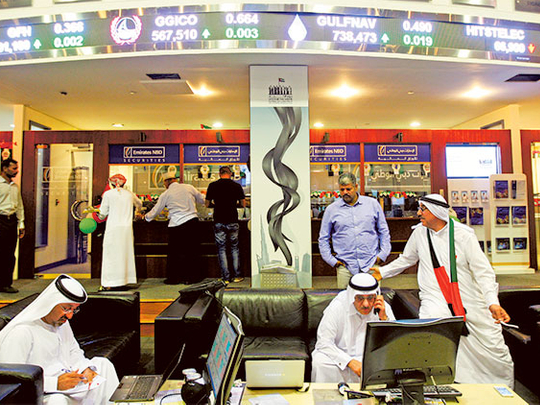
Dubai: Middle East fund managers expect to put money back into Gulf stock markets in coming months once the shock of the plunge in oil prices fades, the latest Reuters survey of regional asset managers shows.
The slide of Brent crude to $70 a barrel last week, from around $115 in June, has shifted the outlook for the oil-exporting Gulf economies. This has caused Gulf equities to underperform after a couple of years of strong outperformance.
The main Saudi stock index has tumbled 19 percent from its September peak, giving up almost all of this year’s gains; Dubai’s index is down 17 percent from this year’s high. By contrast, the MSCI emerging markets index
is down just 9 percent.
In the survey of 15 leading Middle East investment managers, conducted over the past 10 days, many said Gulf stock markets could drop further in the short term if oil remained weak.
“The sharp drop of oil prices and the uncertainty over future prices in the medium term mean buy-side liquidity has continued to stay out until it’s clearer...” said Mohammed Ali Yasin, managing director of NBAD Securities in Abu Dhabi.
“In the absence of catalyst events in December, and without any company news, markets are expected to continue their current trends, or maybe go slightly lower, as they will be weak to any sell-offs or profit-taking activities before year-end.”
However, he and others said the longer-term outlook for Gulf equities was not bearish, and that valuations might now have come down far enough to permit substantial flows of funds back into the markets early next year.
The survey found 53 percent of fund managers expecting to raise their allocations to Middle East stocks over the next three months, and 27 percent expecting to reduce them.
That was little changed from last month’s survey, which was conducted when Brent crude was around $85 and found 47 percent of managers intending to raise Middle East equity allocations, and 20 percent intending to decrease them.
The most recent survey showed 53 percent of funds expecting to raise Saudi Arabian equity allocations over the next three months, despite the heavy dependence of the Saudi economy on oil and the large weightings of petrochemical firms - roughly one-third - in its stock market. Twenty percent expect to reduce Saudi equity allocations.
In the United Arab Emirates, where bourses feature few stocks directly related to oil and are instead focused on banks and real estate firms, 47 percent anticipate raising equity allocations and 20 percent see themselves reducing them.
No collapse
A year of $70 oil would slash the tens of billions of dollars in oil income pouring into the Gulf states. But it would not necessarily force sharp slowdowns in economic growth or corporate profits.
That is because the oil wealth goes into the coffers of Gulf governments. With oil at $70, Saudi Arabia and the United Arab Emirates will probably start posting state budget deficits, but they can keep spending at high levels if they dig into their huge fiscal reserves or finance themselves with debt issues.
Most fund managers and analysts expect governments to do exactly that; state spending growth in the big Gulf economies may slow but looks unlikely to go into reverse. Bahrain and Oman have weaker finances and may be forced to cut back much more sharply, but their economies are tiny.
In the worst case, next year’s growth in the big Gulf economies may not reach the levels of above 4 percent that analysts were predicting a few months ago, but it is likely to stay robust by the standards of much of the rest of the world.
“The key point is that the region is in a strong position to absorb the hit to its income,” said Jason Tuvey, Middle East economist at Capital Economics in London.
“Admittedly, budget positions in a number of countries may now be in deficit. But these can be easily financed by issuing debt or drawing down large savings. Moreover, oil prices would have to fall further before the region’s aggregate current account position swung from surplus to deficit.”
He added, “The upshot is that a period of lower oil prices is unlikely to cause growth across the region to collapse.”
Earnings of petrochemical producers would be hardest hit by oil at $70; Gulf producers would lose the competitive advantage they enjoy over foreign rivals from low feedstock prices, and would face valuation losses on their inventories. Analysts have already slashed their average forecast for the Saudi petrochemical sector’s earnings growth this year to 13 percent from 25 percent, according to Thomson Reuters data.
With the Saudi private sector in good health, the impact on other industries would be significant but less dramatic.
Earnings across the entire Saudi stock market are now expected to grow 12 percent this year, instead of 17 percent forecast in mid-September.
Other big Gulf stock markets, less exposed to petrochemical earnings, would see a weaker effect.
Egypt, Turkey
The Reuters survey also showed interest among Middle East fund managers in stock markets that could benefit from lower oil prices.
Cheaper global energy costs could give a boost to Egypt, shrinking its external deficit, reducing pressure on state finances from energy subsidies, and making it easier to address the power shortages that have plagued industry.
A third of fund managers expect to raise their Egyptian equity allocations over the next three months, while 13 percent expect to reduce them.
The biggest boost may be to investor perceptions of Turkey, which has struggled over the past year with currency volatility and capital flight related to a big external deficit that is swollen by energy imports.
The latest survey showed 20 percent of fund managers expecting to raise their Turkish equity allocations and 7 expecting percent to reduce them - the most bullish balance since the survey was launched in September 2013.












